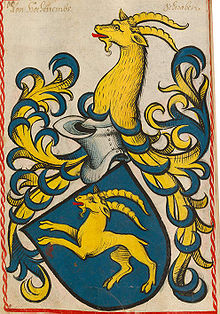Ferdinand Karl von Hohenems
Ferdinand Karl von Hohenems (born December 29, 1650 - † February 18, 1686 in Kaufbeuren ) was a count from the noble family Hohenems-Vaduz . He became known through the extensive witch trials that he carried out between 1678 and 1680 in what is now the Principality of Liechtenstein . In 1684 he was dismissed by an imperial commission of inquiry because of these trials. He died as a prisoner at Kemnat Castle near Kaufbeuren in the Allgäu .
Life
Ferdinand Karl von Hohenems was the eldest son of Franz Wilhelm I von Hohenems and Countess Eleonora Katharina von Füstenberg . He had four siblings, including Jakob Hannibal III. von Hohenems and Franz Wilhelm II. von Hohenems . After the death of his father, at the age of twelve, he took over the affairs of government in the counties of Vaduz and Schellenberg. Since he was still far too young for this task, a guardianship government was appointed. Emperor Leopold I appointed his mother and uncle Karl Friedrich for this task. From 1656 to 1667 the young count attended the Jesuit Latin school in Feldkirch, with a few interruptions . On November 12, 1669, he enrolled at the University of Salzburg . He was considered spirited, moody and prone to extensive violence, even against his own siblings. After the death of his uncle Karl Friedrich on October 20, 1675, he took over the business of government himself. His rule was shaped by waste, arbitrariness and violence. He squandered his siblings' fortunes and inheritance.
Ferdinand Karl von Hohenems launched various witch trials and enriched himself with the assets of the executed. In 1681 the execution of the Reich was initiated against him and the Kempten abbot Rupert was commissioned to carry it out. It was his own brother Jakob Hannibal III. von Hohenems , who reported him to the emperor. But his subjects had also made representations to the emperor. On June 22nd, 1684, the count was deposed after he had already lost sovereignty over criminal jurisdiction in 1683 and had been arrested. He was also obliged to return the illegally acquired property to the surviving dependents of the victims. He spent the last years of his life as a prisoner in Kaufbeuren.
Consequences of his rule
After his dismissal, his brother Jakob Hannibal III. von Hohenems Regent of Vaduz and Schellenberg. Unable to pay his brother's accumulated debts, the counties were placed under administration several times. After lengthy negotiations with the surviving dependents of the victims and other creditors, in 1699 he sold the County of Schellenberg to Johann Adam I of Liechtenstein for 115,000 guilders and in 1712 also the county of Vaduz for 290,000 guilders. These sales resulted in today's Principality of Liechtenstein.
Web links
- Karl Heinz Burmeister : Hohenems, Ferdinand Karl von. In: Historical Lexicon of the Principality of Liechtenstein .
Individual evidence
- ↑ Bernd Marquard: 122 witch trials, the highest imperial jurisdiction and a count deposition. The imperial immediate county of Vaduz for abuse of power before the Reichshofrat (1678-1712) . In: Andreas Bauer and Karl HL Welker (eds.): Europe and its regions. 2000 years of legal history . Böhlau, Cologne 2007, ISBN 978-3-412-13804-2 , pp. 377 ( limited preview in Google Book search). .
- ^ Report on the blasphemous life of Count Ferdinand Karl Franz von Hohenems in Vaduz
- ↑ Otto Seger: The last act in the drama of the witch trials in the county of Vaduz and rule Schellenberg . In: Yearbook of the Historical Association for the Principality of Liechtenstein . tape 57 . Vaduz 1957, p. 165 ( eliechtensteinensia.li [PDF; 2.6 MB ; accessed on June 23, 2013]).
- ^ Klaus Biedermann: Yearbook of the historical association. Volume 111 Historical Association for the Principality of Liechtenstein
| personal data | |
|---|---|
| SURNAME | Hohenems, Ferdinand Karl von |
| BRIEF DESCRIPTION | Count from the noble family Hohenems-Vaduz |
| DATE OF BIRTH | December 29, 1650 |
| DATE OF DEATH | February 18, 1686 |
| Place of death | Kaufbeuren |

